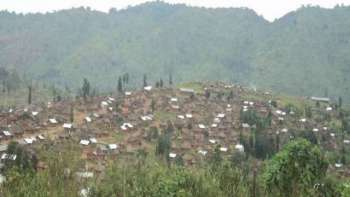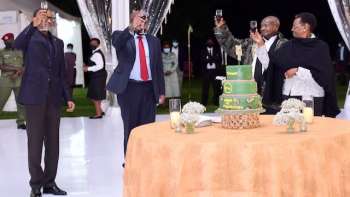Colonel Theoneste Bagosora, one of the Rwandan military heroes who fought against the rebel forces seeking to reinstall a repressive ethnic monarchy following the Rwandan independance, has died. He was 80 years old. Colonel Theoneste Bagosora was in detention in Bamako, the country of Mali, West Africa, after a widely controversial sentence to 35 years in prison by the International Criminal Tribunal on Rwanda (ICTR) for crimes of genocide and wars crimes allegedly committed during the 1990-1994 Rwandan civil war. Accused of being one of the top leaders during the 1990-1994 Rwandan civil war and genocide, Colonel Theoneste Bagosora, during lenghty trials, mistrials, unproven accusations, acquittals, and retrials, was finally sentenced, despite obvious lack of evidences and merits. According to sources close to the family, Colonel Bagosora died of natural death, after a visit by his family members and with the hope of overdue justice in Rwanda and for all Rwandans.
Colonel Theoneste Bagosora: A Controversial Case, ICTR Failures, and a Scapegoat.
On April 6, 1994 a plane carrying the Presidents Juvénal Habyarimana and Cyprien Ntaryamira, their close collaborators, as well as French crew members, was shot down by a missile. The Presidents were coming from Arusha, Tanzania, after concluding a peace agreement with the rebels of the Rwandan Patriotic Front (RPF-Inkotanyi) that had invaded the country from Uganda since October 1, 1990. According to widely accepted reports, the plane was shot down by the RPF-Inkotanyi who wanted unshared power at all cost.
The assassination of the presidents and the massacres that followed set off a regional humanitarian catastrophe whose consequences are still felt 27 years later. Based on estimates from the NGOs, experts, and, most importantly, the United Nations, the assassination of Juvenal Habyarimana and Cyprien Ntaryamira has led to more than 7 million deaths, so far. Innocent Tutsis civillians were systematically targeted by Hutu militias, while innocent Hutus civilians were systematically massacred by Tutsis extremists operating within the Rwandan Patriotic Front (RPF-Inkotanyi) led by the current Rwandan dictator Paul Kagame.
On April 29, 1994, Prudence Bushnell, then US Deputy Assistant Secretary for African Affairs, called Colonel Theoneste Bagosora, then one of the leading Rwandan military officials, warning him of the displeasure of the United States with the ex-FAR on the on-going massacres of Tutsis. A few weeks earlier, just before the assassination of President Habyarimana, later widely blamed on the current Rwandan President Paul Kagame, his ruling elite and military junta, Ms. Bushnell had written a memorandum pointing to grave violations of human rights, widespread violence, and breakdown in the rule of law in Rwanda. She expressed the concern of seeing the takeover of the Rwandan Government by rogues elements. She recommended that the US Government intervene before it was too late.
Three months later, after massive and systematic massacres, the ethnic majority Hutu government was overthrown by the ethnic minority Tutsi in an orgy of violence the World had never seen since the Holocaust. The massive and systematic massacres had started with the invasion of the country by RPF-Inkotanyi on October 1, 1990, with the support of the current Ugandan President Yoweri Museveni. The massacres are still on-going inside Rwanda and in Eastern Democratic Republic of the Congo.
Following that conversation with Prudence Bushnell, Colonel Bagosora became one of , if not the main, targets of the accusations of crimes of genocide and war crimes committed in Rwanda, prosecuted in front of the International Criminal Tribunal for the Rwanda (ICTR). However, independent observers, legal experts, even the prosecutors at the International Criminal Tribunal for the Rwanda (ICTR) have questionned the process and the intentions of the ICTR. They questionned why some individuals like Colonel Theoneste Bagosora and others from just one side of the civil war of 1990-1994 were targeted by the tribunal when the Rwandan Patriotic Front (RPF-Inkotanyi) and its army, the Rwandan Patriotic Army (RPA) and its leaders, who are behind documented systematic massacres, genocide and war crimes of Hutus civilians, were never prosecuted.
In a letter to one of the Rwandan civil and humanitarian rights organization, Carla Del Ponte, then the Prosecutor for the Internation Criminal Tribunal for the Rwanda (ICTR) confirmed that she was pursuing charges against Kagame and the Rwandan Patriotic Front. These charges included crimes against humanity and genocide committed by the Rwandan Patriotic Army between January and December 1994.
These crimes also included the assassination of the presidents of Rwanda and Burundi. Ms. Carla Del Ponte assured the organization that ICTR will do whatever it takes to bring those responsible for these crimes to justice. Suddenly after, when the Rwandan government led by RPF leaders learned of Carla Del Ponte' s committment, they attacked the ICTR, claiming that the ICTR had no mendate and cannot investigate crimes against humanity and of genocide committed by its soldiers. The Rwandan RPF-led government accused ICTR of incompetence.
The ICTR, under the pressure of the Rwandan Government and its allies, shifted its targets. Colonel Bagosora became the scapegoat and the supposedly "genocide mastermind" and a member of a fictional "Akazu", an alledged group of genocide planners led by Agathe Kanziga, the widow of President Juvenal Habyarimana, and including Protais Zigiranyirazo, brother-in-law of President Juvenal Habyarimana (see here: Rwanda - France: French Court Renders Controversial Judgment on Rwandan First Lady Agathe Habyarimana's Request for Case Dismissal )
Since then, Rwandan refugees, activists, and legal experts have criticized the ICTR of being an instrument of the Rwandan Patriotic Front and of only targeting one ethnic group.
In December 2008, the Trial Chamber-1 at the ICTR acquitted the four highest-ranking senior military officers of the former government army, the ex-Forces Armee Rwandaise (ex-FAR), including General Theoneste Bagosora of conspiracy to commit genocide.
In November, 2009, the Appeals Chambers of the ICTR acquitted Protais Zigiranyirazo, brother-in-law of President Juvenal Habyarimana, of all charges of "genocide planning", following seven years of trial at the ICTR, where the court found that the Prosecutor's evidence was explained by normal military planning in the course of the four year (1990-1994). Rwandan civil war.
Hence the acquittal of Colonel Theoneste Bagosora and Protais Zigiranyirazo showed that the plannig of genocide and the existence of "Akazi" were a fiction.
However, Colonel Bagosora, as the key scapegoat pursued by the ICTR was charged with other crimes, without clear merits or evidences.
Then, The Rwandan Government went as far as targeting defense attorneys who sought to find what really happened. One of the attorneys, Professor Peter Erlinder was detained in Rwanda and prosecuted, for trying to seek evidences showing that Colonel Theoneste Bagosora and another accused, Major Aloys Ntabakuze, were innocent of the crimes they were accused of. Peter Erlinder was arrested in Kigali, Rwanda on 28 May 2010 while attempting to represent a Rwandan opposition leader accused of "genocide denial" and "terrorism."
In its October 6, 2010 ruling following the case introduced by one of Peter Erlinder''s client, Major Aloys Ntabakuze, the Appeals Chamber found that Defense Counsels benefited from immunity from personal arrest or detention while performing their duties assigned by the Tribunal and also with respect to words spoken or written and acts done by them in the course of the performance of their duties as Defense counsel before the Tribunal. Peter Erlinder was realeased following the pressure from the USA Government. (see our articles: US Congress Presses Rwanda on Jailed Lawyer ; Rwanda Releases American Lawyer and Rwandan Security Services Planned to assassinate Peter Erlinder ).
In the end, Colonel Theoneste Bagosora was masterly defended by the legal counsel Raphael Constant , from Martinique. The ICTR did not find him guilty of planning or organizing “genocide”, killings, or personal involvment in killings or war crimes. Apparently to cover the themselves, judges at the ICTR found him guilty of negligence, as the military leader of for a few days following the assassination of President Habyarimana on April 6, 1994.Colonel Theoneste Bagosora: A Hero of Fight Against the Repressive Ethnic Monarchy
Colonel Theonest Bagosora hailed from what was known as Commune Karago, Prefecture Gisenyi, Rwanda. After studies in Seminary, he joined the school for military officers. In late 1959 and early 1960, the country of Rwanda gained independence from Belgium and the population uprising overthrew the ethnic monarchy that had kept the majority Hutu population under the shacles of servitude to the small minority from the Tutsi ethnic group. Some Tutsis extremists, known as Inyenzi, who supported the monarchy, launched an insurgency. They conducted deadly attacks against the new independent country and massacred thousands of Hutu and Tutsi civilians who did not or no longer supported the repressive Tutsi monarchy across the entire country.
The new Rwandan army faced these insurgents with determination and defeated the insurgency by 1967. Colonel Theonest Bagosora, then a young military officer, was at the forefront of the war against Inyenzi, often a commander of the attacks behind enemy lines. With his bravery, he became a national hero, well respected among the military officers. He quickly rised through the military ranks and later played a major role in building the new Rwandan army, known as FAR. He ended up as a top ranking officer in the Ministry of Defense.
He was the brother-in-law of Matthias Nyagasaza, a Rwandan political figure and a prominent businessman who died, at 75, in a hospital in Gisenyi, Rwanda after a controversial detention. Matthias Nyagasaza had been arrested, along with other businesspeople, after attending the Unity and Reconciliation Conference held in Kigali on October 26-28, 2002, despite assurances against any arrest and affidavits of good behavior and clean judicial record received from the Rwandan Ambassador in Nairobi, Seth Kamanzi, Gisenyi Prefect, Fidele Mitsindo, and the Minister of Interior Security, Jean de Dieu Ntiruhungwa. His welfare went from bad to worse following constant mistreatment and lengthy court procedures. According to sources in Rwanda, he was mostly mistreated for being the brother-in-law of Colonel Bagosora and the in-law of Colonel Sagatwa, who was assassinated in 1994, in the terrorist attack widely blamed on the military leaders of current Rwandan regime. Rwandan and Burundian presidents Juvenal Habyarimana and Cyprien Ntaryamira and their close advisers died in the same attack. Matthias Nyagasaza had refused to testify against Colonel Bagosora and was tortured and mistreated. He was abruptly released to avoid accusations of assassination, when the government realized he was dying. He died in early January 2010. For more see here ( "Kigali: Matthias Nyagasaza, Unity conference participant imprisoned; MDR threatened" of November 14, 2002 in African Great Lakes [ African Great Lakes News and Events Roundup in 2002: Rwanda, Burundi, Congo, Zaire, Uganda, Angola, Zimbabwe, Kenya, Tanzania] at http://www.afroamerica.net/Africa/Africa_Great_Lakes/Entries/2002/12/31_African_Great_Lakes_Events_Roundup__2002.html)
According to AfroAmerica Network sources, most of Colonel Theoneste Bagosora's relatives were killed while in exile in Africa and Europe, allegedly by Rwandan government intelligence agents. His brother, Pasteur Musabe, was assassinated in Cameroon and his sister, Regina, was allegedly assassinated in Belgium.
Colonel Theoneste Bagosora's Desire for Justice
According to sources close to the family, Colonel Bagosora died of natural death, after visits by family members. During the visits, he had urged his family members to move forward and continue to seek justice, so that those responsible for the assasination of Presidents Juvénal Habyarimana and Cyprien Ntaryamira, their close collaborators, as well as French crew members and the massacres of Hutus and Tutsis in Rwanda since 1990 be held criminally and civilly accountable.
Advertisement
... ON AMAZON AND BARNES NOBLE-- CLICK HERE
For more on Legs of Tornado: The Human Who Outran the Wind, Visit the site Legs of Of Tornado, here
©2021 AfroAmerica Network.

















